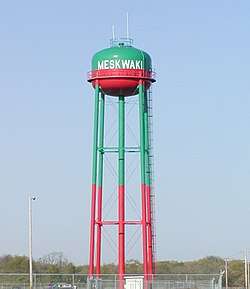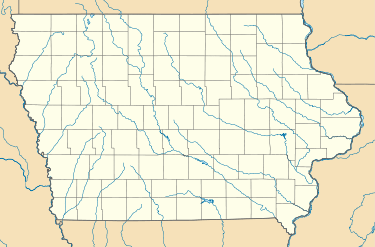Meskwaki Settlement, Iowa
| Meskwaki Settlement, Iowa | |
|---|---|
| Unincorporated community | |
 Water tower, Meskwaki Settlement | |
 Meskwaki Settlement, Iowa | |
| Coordinates: 41°58′51″N 92°39′01″W / 41.98083°N 92.65028°WCoordinates: 41°58′51″N 92°39′01″W / 41.98083°N 92.65028°W | |
| Country | United States |
| State | Iowa |
| County | Tama |
| Time zone | UTC-6 (Central (CST)) |
| • Summer (DST) | UTC-5 (CDT) |
| Area code(s) | 641 |
 "Mesquakie Indians responsible for the establishment of the Mesquakie Settlement," 1857 photograph. | |
| Total population | |
|---|---|
| Enrolled members: 1300 | |
| Regions with significant populations | |
|
| |
| Languages | |
| English, Meskwaki | |
| Religion | |
| Traditional religion (incl. syncretistic forms) | |
| Related ethnic groups | |
| Sac, Kickapoo |
The Meskwaki Settlement is an unincorporated community in Tama County, Iowa, United States, west of Tama.[1] This was part of the historic territory of the Meskwaki, an Algonquian people. (They were known to English colonists and Americans as the Fox.) Since 1857, when Meskwaki bought land here, it has been home to a sizable community of Meskwaki Indians. They are enrolled in the federally recognized Sac and Fox Tribe of the Mississippi in Iowa, one of three Sac and Fox tribes in the United States. The others are located in Oklahoma and Kansas.
Government
The Nation operates a tribal school, tribal courts, public works department, and police force. The settlement includes more than 8,000 acres (32 km2). There are about 1,300 members of this Meskwaki Tribe, of whom about 800 live on the settlement; non-tribal members, including spouses, also live on the settlement.[2][3]
The Meskwaki Casino Resort is located on the Settlement and generates revenue for the welfare of the tribe.[4] The settlement includes land in parts of Indian Village Township, Toledo Township, Tama Township, and Columbia Township. The tribe holds a large pow-wow there each year.[5]
History
The Meskwaki traded with French colonists of the Illinois Country but were forced west by competition in the 18th-century fur trade and later United States development pressures. In the early decades of the 19th century, the Meskawki and Sac were being forced to cede land in Iowa and nearby areas to the United States and to move west of the Mississippi River. The Iowa state legislature passed a law to allow them to buy land, which they did in 1857. Over the following 150 years, the Meskwaki gradually expanded the settlement by purchasing nearby lands. As the settlement was never formally incorporated as a city it has no official name, and was commonly called "Indian Town" into the 20th century. The anthropologist Duren Ward suggested the settlement be named "Meskwakia,"[6] but this name never caught on. The total lands owned by the tribe is called "Meskwakenuk" by the Meskwaki tribal government.[7] In the 21st century, there are three other federally recognized Sac and Fox tribes, who have independent reservations and governments in present-day states of Kansas, Oklahoma and Nebraska.
Notable Meskwaki
- Ray Young Bear, writer[8]
References
- ↑ Elias Ellefson, "What it Means to be a Meskwaki": Ray Young Bear interview, Des Moines Register, 4 September 1994
- ↑ Official site of the Meskwaki Nation
- ↑ Meskwaki Settlement School Archived 2009-04-24 at the Wayback Machine. website
- ↑ Meskwaki Casino Bingo Hotel
- ↑ Meskwaki Annual Pow Wow Association Archived 2008-10-13 at the Wayback Machine.
- ↑ Ward, Duren (1906). "Meskwakia". Iowa Journal of History and Politics. 4 (2): 178–189.
- ↑ [meskwakenuk.maps.arcgis.com "Meskwaki Nation GIS"] Check
|url=value (help). ArcGIS. Retrieved 30 June 2017. - ↑ Elias Ellefson, "What it Means to be a Meskwaki": Ray Young Bear interview, Des Moines Register, 4 September 1994